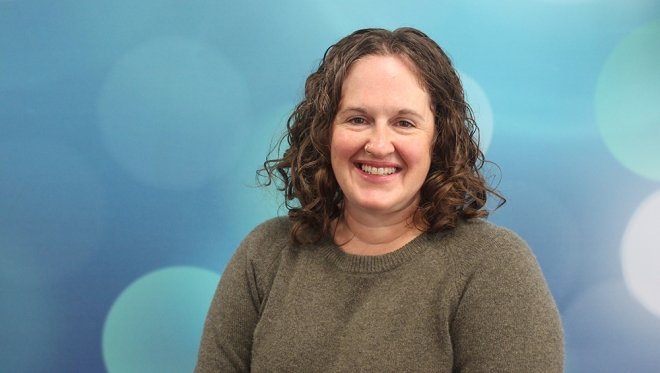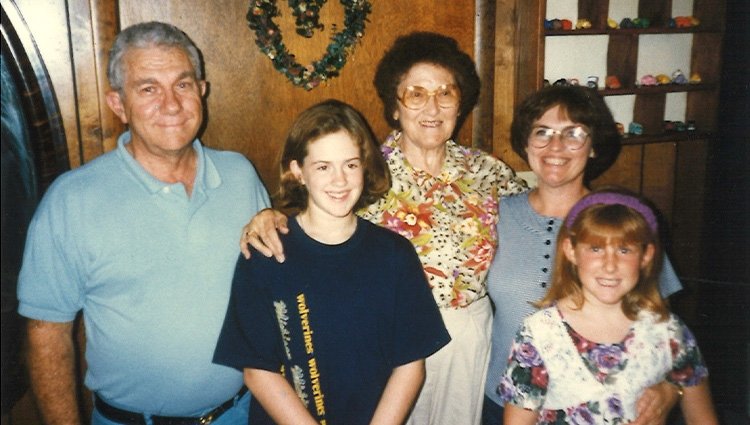A Fourth Generation Educator

Published
Field of Study
MathematicsTeaching is in her blood. Learn why Emily Quinn enjoys the challenge of helping students gain an appreciation of, if not a love, for math.
Being an educator is in Emily Quinn’s blood...literally. She is a fourth-generation educator as an Assistant Professor of Math at Tulsa Community College. Her mother was a Pre-K teacher, her maternal grandfather taught history, her maternal great-grandmother taught in a one-room schoolhouse and her great-grandfather was a principal. In addition, her sister is a fourth-grade teacher.

“Growing up, I always enjoyed helping my mom in her class. I saw how many people you could impact,” says Quinn. “I also worked with the Boys and Girls Club during high school in a tutoring and leadership role. It never felt like work.”
She also heard multiple stories about her family and their love for the education profession as she grew up. “One funny story about my great-grandmother, who taught in a one-room classroom, always stood out to me. One day, she fired the babysitter and took her son, my grandfather, who was still a baby, to school with her. He slept in a box on her desk. She wasn’t letting anything stop her from teaching.”
When Quinn was in high school, her English teacher had the class write individual letters to themselves focusing on what they expected to be doing in 10 years. The teacher promised to mail the letters to the students. After forgetting about the assignment, Quinn received the letter just as promised 10 years later.
"I couldn’t believe it when I opened the letter. I wrote that I wanted to be a math professor,” says Quinn who was working as an adjunct faculty at TCC at the time. “I had completely forgotten that I wanted to teach at the college level. Somehow along the way I thought I wanted to teach middle school or high school math.”
She took the K-12 path after receiving her bachelor’s degree from Northeastern State University and her master’s degree from Oklahoma State University. “I taught middle school math for about four years, only to realize that wasn’t the best place for me.”
Leaving that job was scary and she wasn’t sure what to do next. “I took a job as an adjunct at TCC, and I absolutely loved the college level,” says Quinn, who was hired as full-time faculty in 2018 and was selected as a chair for the Math department in 2022. “Community college is definitely my sweet spot. It is exactly what I want to do for the rest of my life.”
Perspective Changes
“We, as faculty, are learning to be more understanding of our student's needs,” Quinn says recalling a professional development she participated in back in 2019.
“At a workshop with the Center for Urban Education, a group of faculty looked at our policies and procedures and our syllabi to see if our language is understandable to our students,” she explains. “We realized we needed to make some adjustments, so it wasn’t so intimidating. When educators speak the same language as our students, students are more likely to share their struggles.”
Little did she know then just how much it would shape her work and life when a global pandemic happened.
“2020 was a very hard year for everybody and especially for me... between personal challenges and the loss of a family member to COVID, it was terrible. But my faculty picked up the slack and my Dean was very supportive.”
She wants to be able to do that for students too.
“Just the other day one student told me, ‘Hey I know this is none of your business, but I decided to get a therapist and it’s really gonna make a big difference. I appreciate you for listening to me.’”
She adds, “So many of our students are dealing with challenges every day. I have high expectations for them, but my timeline isn’t always set in stone. I’ve tried to make sure that I’m aware of all of the different mental health resources the school provides, and that I know how to connect students with those resources. Even if they don’t take advantage of the resources, they know that I care about them and that TCC offers support.”
What is it about TCC that appeals to you?
“I really like the challenge of teaching classes where the students aren’t there because they love math; they are there because they have to be. As a math instructor, you’re used to walking into a class full of students who already don’t like you because you’re their math teacher. I think it’s a huge part of my job to help them grow an appreciation for, if not a love, for math. Every semester, I want students to say, ‘Wow, that was interesting’ or ‘that was useful’ or ‘I can do this.’
“In my syllabus, I have the institutional learning outcomes, but I also include a section of what I personally want students to get out of their class... things like -- recognizing math in the media and out in the world; having faith that you can pass your next math class. And if those things happen regardless of their grade, they’ve made progress.... they’ve grown.”
Quinn adds, “TCC students are looking for ways to improve their situations and their lives and the lives of their family, in whatever form that comes. And if we can help them do that, that’s the main goal.”
Where can we find you outside of TCC?
“I love to travel and be outside -- hiking, kayaking, and gardening. I’m also in a horror book club. The scariest book I’ve ever read has been ‘The Grip of It: A Novel' by Jac Jemc.”
Do you watch scary movies too?
“Nope! Weirdly enough, I can’t handle them,” adds Quinn. “If it’s a book, I can stop reading when it gets too scary, or I can just take a minute to regroup. There are no jump scares in books... they don’t have the sounds leading up to it making you all anxious. But I’ll read all the scary books.”
